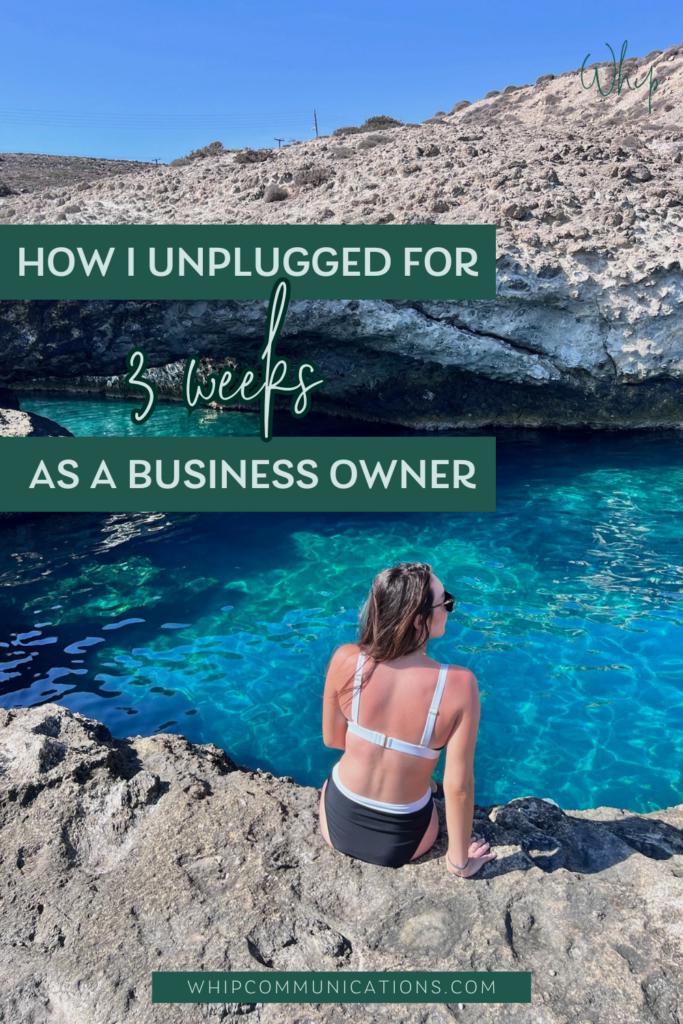In a world where “hustle culture” is celebrated, entrepreneurs often feel like they can’t take time off — much less unplug — because unlike a traditional 9 to 5 with PTO, the business owner’s mindset is often “if I don’t work, I won’t get paid.”
And sometimes, that is true. But in most cases, it’s not! It’s just the current culture of over-work and over-hustle that we’ve been brainwashed to believe.
Here’s the truth: I was able to take 3 weeks off for a bucket-list trip to Greece this summer, and I only replied to 3 emails the whole time.
As an entrepreneur, stepping away from your business can feel like a no-go. However, taking time off is crucial for recharging and gaining new perspectives —and I believe that business ownership is meant to make life more flexible, not less flexible.
Here are my four tips to help you take a well-deserved break without leaving your business in a lurch.
1. Plan Ahead When Scheduling
One of the most important steps in ensuring a successful vacation is to plan your time off well in advance. I planned my end-of-August trip in early May, giving my clients a heads-up well in advance. It’s also important to consider your business cycle—try to schedule your trip during a slower period or after completing major projects. This proactive approach allows you to manage client expectations and avoid last-minute stress.
For example, WHIP does a lot of Giving Tuesday planning, so we don’t take long vacations directly before or after Thanksgiving. If you are an accountant, you obviously wouldn’t decide to unplug during tax season. You can’t prepare for some things, but there are plenty of things you can plan around to make life easier!
My mistake: I overlooked being away in the leadup to World Eczema Day, a key date for one of my clients. That added an extra chunk of work to my plate that I wouldn’t have ordinarily had to do in such a short period amount of time.
My tip: Add your out-of-office to relevant calendars. When going out of the office for a week or more, I send a meeting invite to all of my clients for the dates I’ll be out as soon as I book the trip!



2. Leverage Planning Tools
Utilizing planning tools ensures nothing falls through the cracks. Tools like Buffer allow you to schedule social media posts in advance, and Mailchimp (and many other email systems) allows for scheduling email campaigns.
WHIP generally schedules social media 2-3 weeks in advance anyway, but knowing that I’d be out of the office for such a long time required a lot of preparation on the front end! But it also meant that I could enjoy my trip without worrying about posting — especially given the difference in time zones.
My tip: I created and scheduled social media posts for the 3 weeks I was gone (at least) a week before I left so there was time to review, edit, and make any changes.



3. Communicate Clearly and Effectively
Before leaving, communicate your out-of-office plans clearly with your team, clients, and any other stakeholders. Let them know the dates you’ll be unavailable, who they can contact in your absence, and what to expect during that time.
The source of most panic — or angry emails — from clients stems from feeling unsure about what’s going on. Clear communication nips that in the bud before it even starts! Setting expectations upfront to help prevent misunderstandings and keep everyone on the same page.
My tip: If you want to be offline, say so. Don’t say “I’ll be checking email, so if you need anything….” There is nothing wrong with saying “I’ll be out of the office and will respond to emails when I return.” However, if you want to do that, I recommend…a plan B! See tip four, below.



4. Ensure You Have a Plan B
You picked a strategic time to go on vacation. You planned ahead. And you communicated all of this with your clients. You’re good to go, right?
LOL.
Wrong. No plan has ever gone perfectly — especially in the ever-changing digital landscape. Having a backup plan can alleviate anxiety about unexpected issues that may arise while you’re away. Identify a key contact who can step in if something urgent comes up. Knowing you have a solid plan allows you to enjoy your vacation with peace of mind.
For me, Yasmine is the obvious go-to person — she’s worked with me for four years now (!!) and I trust her completely! Plus, most of my clients already know her, too. If you’re a one-person show, look for a friend or colleague who will be your backup in case of emergency.
My tip: Yasmine joined my check-ins with clients the week before my vacation so that 1) she was caught up to speed on what I had done and what would be moving while I was out and 2) so that clients felt comfortable reaching out to her and already had facetime with her.
In Summary…
Taking a vacation as an entrepreneur doesn’t have to be a daunting task. It requires work, YES. You cannot just plan a spur-of-the-moment trip and leave clients hanging out to dry.
But by planning ahead, leveraging the right tools, communicating effectively, and having a backup plan, you can recharge without compromising your business.
Pin for later!📌


Be the first to comment